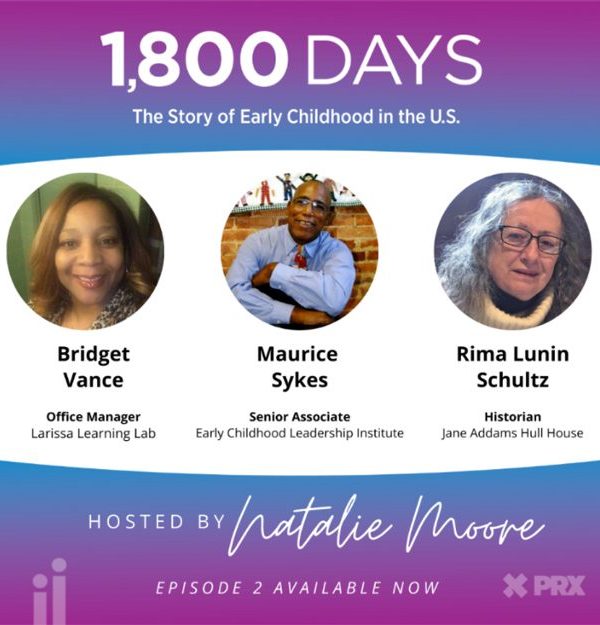Welcome to episode two of Erikson’s new podcast created by Erikson, produced by PRX, and distributed by PRX. Natalie Moore, a renowned author of The South Side and reporter for WBEZ-Chicago Public Radio, is taking us through the history of early childhood care and education, the launch of Head Start, the Preschool for All initiative, and our nation’s current patchwork system of programs, policies, and shortcomings highlighted by the pandemic.
Episode two, what does emancipation, the industrial revolution, the women’s suffrage movement, and the New Deal all have in common? The answer is the development of the childcare industry in the United States, from the days of slavery and leading up to the creation of Head Start.
Natalie visits with Bridget Vance; she and her daughter run the Lorissa Learning Lab, a home-based daycare on Chicago’s South Side. Vance’s education is in accounting, economics, and business but a family situation led to her opening her own daycare, which has been in business for 23 years. After all those years, she sees that fellow providers’ faces are like her own. Vance saw a need for parents and others to get involved in early childhood education. After almost being “wiped out” by changes in state policies. Vance’s commitment is what keeps her in the industry, and she is now pursuing a doctorate in hopes of helping to shape policy.
Natalie states that nationally more than 90% of childcare workers are women and more than 40% are people of color. She takes us back to the very beginning of this country to get an idea of why women and people of color are so over-represented in this industry.
As we think about the beginning of the childcare industry in America, we meet Maurice Sykes, the Senior Associate at the Early Childhood Leadership Institute in Washington, DC. and author of an upcoming book called “Childcare Justice.” Sykes says that the trace of the origins of the enslaved African people in the United States started in 1619. The newly enslaved people that arrived took over from the indentured servants who performed the duties of childcare. He says that it was not uncommon for young, enslaved girls to be put into domestic service and have them serve as a nanny, or a caretaker for a child and the perception grew that this was appropriate work for this population.
As Sykes traces the influence of slavery on how poor children are treated in current childcare settings and how workers in the childcare industry are compensated, most childcare workers don’t know that intrinsic history.
“Until you raise your awareness of what is the systemic activity that is causing you to be in a low wage, low-status job. And that is what this critical consciousness to acknowledge that you are oppressed, and you are oppressed by a society that has very little regard for children has very little guard for women and women as workers.”
Sykes is alerting the workforce that you don’t have to sit and be passive, that you have a voice, and this is an opportunity to rethink, reimagine, and reconstruct the system.
As Natalie looks to discuss the progressive era of the late 1800s and how we’re still dealing with the legacy of slavery more than 150 years after it was abolished, their effects still shape many aspects of our lives today, including how we care for our children.
No one person of the late 1800s had a more significant impact than Jane Addams. Natalie visits with Rima Lunin Schultz, a Jane Addams scholar, and former staff historian at the Hull-House Museum. Though Addams is best known for founding Hull-House, Schultz says many of the causes she was involved in were interconnected.
Jane Addams was at the forefront of an anti-sweatshop movement that raised the issue of women’s work, childcare, and early education. Schultz takes us through the alliances, volunteers, and dedicated women like Alice Putnam, whose Kindergarten teacher program was the first thing hosted by the Hull-House. Shultz also describes how Addams and her colleagues viewed social problems and solutions through a lens of whiteness, something Addams herself admitted later in her life.
As the crusade for kindergarten became a social movement, we can draw a line to the ideas behind Head Start. In our next episode, we visit with Erikson Institute’s co-founder Barbara Taylor Bowman and dive into how a landmark program came to be created.
1,800 Days: The Story of Early Childhood in the U.S. podcast is a five-episode series that feature national figures like Erikson co-founder Barbara Taylor Bowman, educators, caregivers, policymakers, researchers, and advocates. The series will focus on the history of the early childhood field, most notably how the first 1,800 days of every child’s life from birth to kindergarten are the most intense period of development in every person’s lifetime.
Listen to episodes of 1,800 Days wherever you get your podcasts. Join the conversation on our Facebook, Twitter, and Instagram pages! For more information, visit www.erikson.edu/podcast.

Join the Erikson family with monthly news + events updates shared by academics, community members, and families.